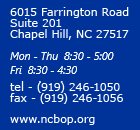About the North Carolina Board of PharmacyThe North Carolina Board of Pharmacy was created by the North Carolina Legislature (Chapter 90 Article 4A) to protect the public health, safety and welfare in pharmaceutical matters. The Board sets standards for academic and practical experience programs prior to licensure, issues permits to operate pharmacies and annually renews licenses and permits. The Board Members meet on the third Tuesday of the month in the Board's Chapel Hill office to conduct business, set policy and hold disciplinary hearings for pharmacists and pharmacies. These meeting are open to the public except during the time when the Board Members are in closed session deliberating a decision for a disciplinary action. A Board Staff is employed to maintain permits and licenses, inspect pharmacies and investigate situations that may be violations of the state Pharmacy Practice Act or laws governing the distribution of drugs. There are two ways to become licensed as a pharmacist in North Carolina - licensure by examination and licensure by reciprocity. A person may become licensed by examination at any time during the year. Reciprocity occurs six times a year in the odd-numbered months for licensure of pharmacists from other states. The Board cannot lobby for or against legislation in Raleigh as noted in NCGS 93B, the statute which pertains to licensing boards. No funding is received from the General Assembly and the Board's activities are supported by income primarily from license and permit renewal. The North Carolina Board of Pharmacy consists of six Board Members, (five Pharmacists and one public Member), and 26 employed Board staff. More information about the current Board Members here.
THURSDAY, OCTOBER 24, 2013 State Auditor Report - The North Carolina State Auditor's Office has released its report of the NC Board of Pharmacy's audit. The report, and the Board's response, may be found here: http://www.ncauditor.net/EpsWeb/Reports/FiscalControl/FCA-2013-8151.pdf
|

